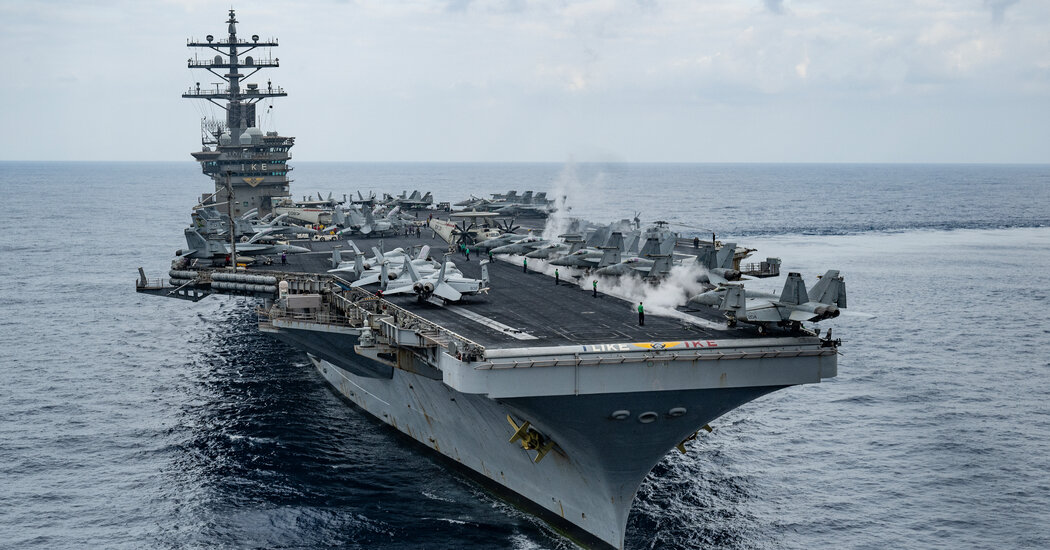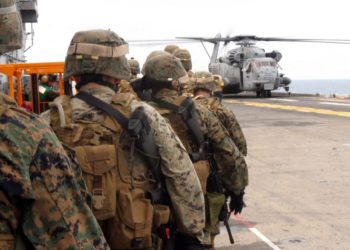The largest commercial shipping companies continue to avoid the Red Sea and Suez Canal, despite a recent cease-fire agreement between the United States and Houthis intended to make the trade lanes safer.
The cease-fire, which began May 6, ended a U.S. campaign that involved over 1,100 strikes against the Houthis in Yemen and became a source of embarrassment for the Trump administration after group chats about the strikes inadvertently became public. The Pentagon had planned on a monthslong bombardment, but President Trump ended it after about 50 days.
“If the intention was to restore freedom of navigation, which is what they stated it was, then the results speak for themselves: The shipping industry has not gone back,” said Richard Meade, editor in chief of Lloyd’s List, a shipping publication.
Ship traffic through the Red Sea is down by around three-fifths since 2023 when the Houthis started targeting ships there in solidarity with Hamas in its war with Israel in Gaza, Mr. Meade said. Fearing that their vessels would be struck, big shipping companies avoided the Red Sea and the Suez Canal, taking a much longer route around the southern tip of Africa to travel between Asia and Europe.
The Houthis have said they are still at war with Israel and will attack vessels bound for the country. And though the Houthis have not attacked a commercial vessel since December, shipping companies say they worry that their vessels may be hit, deliberately or mistakenly, and have no plans to sail the southern part of the Red Sea anytime soon.
“We’re pretty far from the threshold,” said Vincent Clerc, the chief executive of A.P. Moller-Maersk, a large shipping line based in Copenhagen. Speaking soon after the cease-fire in May, he said the Red Sea would have to remain safe for the foreseeable future before the company’s vessels returned.
Shipping executives said they also feared a severe disruption to their networks if they returned to the Red Sea but suddenly had to pull out of the region because attacks resumed.
When Mr. Trump started the military engagement with the Houthis in March, he said their attacks on shipping had cost the global economy “BILLIONS of dollars.” Commenting on the cease-fire, he said, “They say they will not be blowing up ships anymore.”
Oman brokered the cease-fire between the Houthis and the United States. Describing the truce, Oman’s foreign minister said that “neither side will target the other, including American vessels, in the Red Sea and Bab al-Mandab Strait, ensuring freedom of navigation and the smooth flow of international commercial shipping.”
But maritime analysts said it was unclear whether the cease-fire applied just to American ships.
“Was this only an agreement between the Americans and the Houthis not to fire at each other’s military capabilities, or was this something that did indeed also cover the merchant ships going through the area?” asked Jakob Larsen, chief safety and security officer at BIMCO, a shipping trade group.
Nor did the cease-fire appear to involve the Houthis’ conflict with Israel.
The Houthis expanded their attacks on Israel last month to include vessels at or on their way to Haifa, an Israeli port, noted Jack Kennedy, head of country risk for the Middle East and North Africa at S&P Global Market Intelligence. And while the Houthis are unlikely to attack American vessels during their cease-fire, “the unclear designations around a vessel or company’s relationship to Israel and Israeli ports, and uncertainties around Houthi targeting accuracy, mean there is a severe risk to ships transiting the Red Sea,” Mr. Kennedy said.
In an email to The New York Times, the Houthi-linked group that communicates with the shipping industry said that “no guarantees can be provided to shipping companies.”
The group added: “Sanctions and prohibitions are limited exclusively to companies and vessels affiliated with or linked to” Israel. The group also said the Yemeni Armed Forces’ actions “are carried out through a precise mechanism designed to prevent mistakes.”
The White House and the Pentagon did not comment.
Even though the route around Africa uses more fuel and crews are at sea for longer, shipping operations have adapted to the detour.
“If it were really a pain, if this new route was really imposing costs, I think you might see more countries willing to take the risk,” said Jennifer Kavanagh, director of military analysis at Defense Priorities, a research institute that favors restraint in foreign policy.
In fact, traveling longer distances has allowed the shipping lines to deploy the glut of new ships that they ordered during the pandemic trade boom. Before the Red Sea attacks, the supply of new vessels threatened to depress shipping rates and the earnings of shipping companies.
“Frankly, this disruption, this long way round, has allowed the industry to a certain extent to defy economic gravity,” Mr. Meade, the editor, said.
Still, one large shipping company, CMA CGM, based in Marseilles in France, has been sending a small number of vessels through the Red Sea. Ship tracking sites showed that, in recent weeks, at least five had been in the southern part of the Red Sea, near Yemen.
But CMA CGM said in a statement that it did “not plan to resume transits through the Suez Canal on a large scale in the short term, unless security conditions allow it.”
The rerouting of vessels away from the Red Sea has deprived Egypt of billions of much-needed dollars in toll revenue from the Suez Canal. To coax shipping companies back, the canal is offering large vessels a 15 percent discount to go through the canal.
Peter Eavis reports on the business of moving stuff around the world.
The post Red Sea Passage Remains a No-Go for Shipping Despite U.S. Action appeared first on New York Times.




